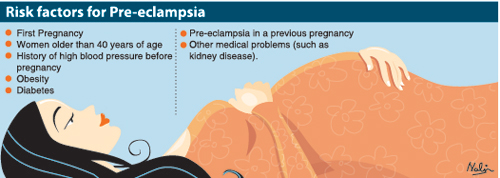Pre-eclampsia: Keep a close check on that blood pressure
Though easily managed, hypertension in pregnancy remains the leading cause of maternal mortality among Sri Lankan women says Dr. Nalinda Rodrigo, Consultant Gynaecologist and Obstetrician. What goes wrong? Blood pressure checks, so routine in most obstetrician’s offices should pick up the problem, but hypertension needs to be diagnosed early and then monitored carefully for treatment to be successful. Fail at one or the other, and both the mother and her child’s lives hang in the balance.

The condition, known by other names including Eclampsia and Toxemia, can also cause miscarriages, placental abruption and pre-term deliveries. Even if the birth proceeds smoothly, mothers can be left with chronic hypertension and subsequently an increased vulnerability to cardiovascular disease. Of course, for some of them, the chronic hypertension actually precedes the pregnancy. Mothers over the age of 40, women with diabetes or kidney disease or women who’ve developed it during a previous pregnancy might go into a new pregnancy already displaying symptoms of hypertension – one reason why Dr. Rodrigo recommends a thorough pre-pregnancy check-up. “However, first time mothers are most at risk for developing the condition,” says Dr. Rodrigo, adding that this typically happens in the latter part of the pregnancy, in the region of 28 weeks.
Hypertension can manifest itself in different ways during pregnancy. The three most common are: Chronic Hypertension where women are found to have high blood pressure (i.e. over 140/90) before pregnancy, early in pregnancy (before 20 weeks), or carry it on after delivery. Then there’s Gestational Hypertension which develops after week 20 of the pregnancy but subsides after delivery. The third variety, known as Pre-eclampsia is the most dangerous. If left unchecked, both chronic hypertension and gestational hypertension can result in this severe form of hypertension toward week 20 of pregnancy. Pre-eclampsia can be identified not only by high blood pressure but by the presence of protein in the urine.
Women with pre-eclampsia also often display some of the following warning symptoms which may either develop gradually or strike suddenly in the last few weeks of pregnancy: Persistent headaches are cause for concern as are changes in vision, including blurred vision, flashing lights, sensitivity to light and vision loss. Many women with pre-eclampsia complain of upper abdominal pain, usually on the right side.
Sudden weight gain is also common, with patients typically putting on over 2kg a week. Swelling, particularly in the face and hands is a confusing symptom because it can occur both in a normal pregnancy but might be an indication of pre-eclampsia.
While the mother is distressed, the baby too is affected. Pre-eclampsia can interfere with the placenta receiving enough blood, cautions Dr. Rodrigo, which in turn can lead to the baby being very small at birth. In some cases, the placenta prematurely separates from the uterus in a process known as placental abruption. It can deprive the baby of oxygen and cause heavy bleeding in the mother.
This initial deprivation puts children in the long run at greater risk of developing learning disabilities, epilepsy, cerebral palsy and hearing and vision problems. Doctors can check up on the baby in the womb by asking for a Doppler Ultrasound scan to examine the flow of blood through foetal blood vessels to vital organs.
Eclampsia is the final and most severe manifestation of pre-eclampsia and occurs when the condition is left untreated. Women with the condition can have seizures and fits caused by cerebral edema or the accumulation of excess fluid in the brain, reveals Dr. Rodrigo, explaining that it can strike before, during and even after childbirth.
Treating hypertension during pregnancy is very much a matter of its degree and time of discovery. If caught early enough, that is before 16 weeks, a daily dose of aspirin can provide an easy and effective way of managing a mother’s condition, he explains. Asprin could also be considered for women who are high risk or showing indications of developing hypertension.
In cases of mild pre-eclampsia (where the blood pressure is greater than 140/90 but appears in a woman without a previous history of hypertension) careful observation and restriction on activity can do the trick. If the baby is still pre-term, doctors can afford to ask parents to wait in such cases, trusting to smart management to keep both mother and baby safe. However, if the baby is close to term, labour may be induced.
When it comes to treating more severe forms of pre-eclampsia, doctors might find themselves faced with a difficult decision. Mothers who have begun to display vision or lung problems, are complaining of abdominal pain, or whose foetus’ are in distress, require immediate treatment. Often this means the baby must be delivered, regardless of how ready it is to face the world outside its mother’s body.
Encouragingly, lifestyle changes can make a big difference, says Dr. Rodrigo. Would be mothers who have not stopped smoking will greatly benefit both themselves and their children if they do so. Weight reduction in obese women, curtailing alcohol consumption and incorporating a gentle exercise routine into daily life can also provide numerous benefits. Women with hypertension should be encouraged to keep their dietary sodium intake low.
Unfortunately, the condition is not entirely well understood. Getting pregnant while still young is one way of reducing the risk of hypertension but Dr. Rodrigo recommends that women get a pre-conceptual review – in this case they needn’t even visit a specialist. All they need is for a general practitioner to see if anything is wrong, and if it is, to help them be perfectly healthy before they attempt to get pregnant.
Follow @timesonlinelk
comments powered by Disqus


















